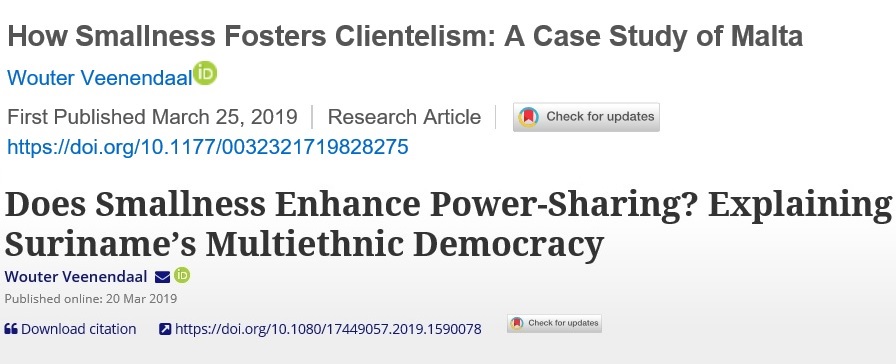
26 Mar New publications on clientelism and political stability in Malta and Suriname
Are clientelism and patronage more likely to emerge in small societies? In two newly published articles, ‘How smallness fosters clientelism: A case study of Malta‘ and ‘Does smallness enhance power-sharing? Explaining Suriname’s multiethnic democracy‘, Wouter Veenendaal addresses this question by examining the effects of state size on clientelism and political stability in Malta and Suriname. While constant direct contact between citizens and politicians in both countries produces clientelistic politics, the political effects of clientelism are markedly different. In the case of Malta, clientelism is found to result in record turnout levels, sharp polarization, and recurrent corruption scandals. In Suriname, where power-sharing is the norm, clientelism ensures that members of each ethnic group have access to state resources, providing a large measure of political stability but also undermining the performance of democracy.
Read more:
How smallness fosters clientelism: A case study of Malta in Sage Journals. Open Acces.
While it has long been assumed that smaller communities are more prone to particularistic politics, the relationship between state size and clientelism remains strongly undertheorized. Departing from the assumption that face-to-face contacts, overlapping role relations, stronger monitoring mechanisms, and the enhanced power of single votes contribute to the emergence of patron–client linkages, this article provides an in-depth case study of clientelism in Malta, the smallest member state of the European Union. The analysis reveals not only that patron–client linkages are a ubiquitous feature of political life in Malta, but also that the smallness of Malta strongly affects the functioning of clientelism by eliminating the need for brokers and enhancing the power of clients versus patrons. In addition, clientelism is found to be related to several other characteristics of Maltese politics, among which the sharp polarization between parties, extremely high turnout rates, profound executive dominance, and the incidence of corruption scandals
Does smallness enhance power-sharing? Explaining Suriname’s multiethnic democracy, in Ethnopolitics; Formerly Global Review of Ethnopolitics
Pointing to a number of informal dynamics in small societies that are supposed to enhance cooperation and consensus, traditional studies on power-sharing posit that small states are ‘most likely’ candidates for stable, multiethnic democracy. These assumptions are, however, challenged by the case study literature on small states which highlights a variety of informal patterns that undermine democratic governance. Addressing this contradiction, the present paper provides an in-depth analysis of power-sharing politics in Suriname, a small, culturally heterogeneous country in South America that initially figured as a prominent case in consociational theory. The analysis reveals that the smallness of Suriname strongly affects and shapes the nature of democracy in the country. On the one hand, clientelism ensures that members of each ethnic group included in power-sharing arrangements have access to state resources and services, thus providing a large measure of political stability. On the other hand, clientelism undermines the functioning of multiethnic democracy by a host of negative side effects, among which economic and social dependency of citizens, executive dominance and authoritarian politics, endemic corruption that goes largely unpunished, and state predation by elites. The upshot is that whereas power-sharing arrangements in small societies might indeed be facilitated by a small population size, there is a heavy price to pay in terms of the quality of democracy.




No Comments